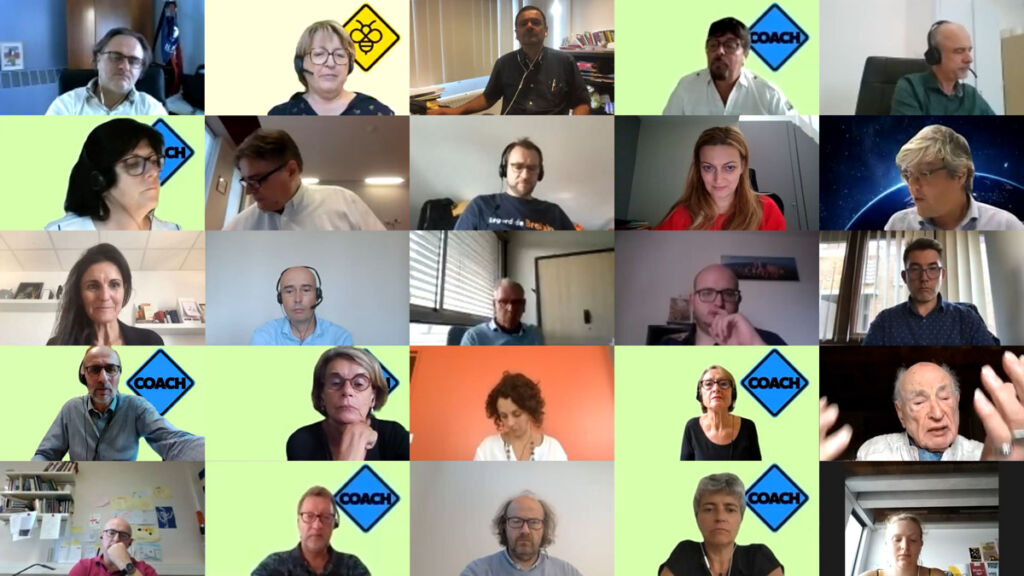Universities and the pandemic: what impact on higher education?
Reflecting on the consequences of the pandemic in higher education in order to better support the process of university transformation. This was the focus of the online symposium organized by UM on September 22, which brought together more than 40 experts virtually.
While the pandemic and lockdown have brought their share of complications to our daily lives, they have also provided an opportunity to take a constructive step back, as Brigitte Lundin illustrates very well. The director of the center for educational innovation support—i-Site MUSE—has been able to use this unprecedented experience to reflect deeply on the transformation of universities. This initiative was undertaken with Sophie Guichard, director of the Digital Factory at the Conservatoire national des arts et métiers (CNAM), and Thierry Sobanski, director of the digital campus at the Catholic University of Lille.
squaring the circle
Deeply involved in educational innovation, last spring these three colleagues came up with the idea of a symposium to better understand the consequences and implications of the pandemic for higher education. "Higher education is often seen as being built around the triangle of teaching methods, technology, and learning spaces, with students at the center. Our idea is to move students out of that center, to no longer work solely for them but with them,"explains Brigitte Lundin.
It was therefore around this concept, dubbed "squaring the circle," that the symposium took place, bringing together forty participants in a virtual space. Experts, higher education stakeholders, and students were able to exchange ideas in the various workshops on offer. "To ensure free speech and sincere exchanges, it was essential for us that the discussions take place in a non-hierarchical manner," emphasizes Brigitte Lundin.
From consequences to questions
A series of discussions opened by sociologist and leading thinker on complexity Edgar Morin, who in his inaugural speech offered food for thought on how to better consider the role of the university. He called for a fight against unilateralism, simplism, and dogmatism, and also advocated for a fundamentally multidisciplinary university: "We have before us an excellent opportunity to confront a complex reality. This word does not mean complicated, it means that it contains links and interactions between factors that may be biological, social, ecological, psychological, religious, etc."
The workshop discussions highlighted some of the consequences of the pandemic on higher education. The importance of the societal role of universities, the need to reinvent time, pace, and spaces as well as forms and models of assessment... "Understanding uncertainty and the unknown as subjects for learning, developing interdisciplinary communities, and making educational transformation a resource to be shared. All these dimensions are now key to thinking about the education of tomorrow," explains Brigitte Lundin.
"It is the complementarity of all our experiences that will enable us to learn and continue to move forward." This is therefore an ongoing process that profoundly challenges our institution by placing at the heart of the debate the long-term co-construction and the financial, cultural, and regulatory obstacles that must be overcome so that the university can fully occupy its place and play a role throughout our lives. These are all avenues for future discussion.
A high-caliber cast
Among the forty or so experts who made up the impressive lineup for this symposium were: Anne Sophie Barthez, Director General of Higher Education and Professional Integration at the Ministry of ESRI, François Taddei, Director of the Paris Interdisciplinary Research Center, Jean-Charles Cailliez, Vice President for Innovation and Development atthe Catholic University of Lille, and Benoît Raucent, President of the Louvain Learning Lab.
Many representatives from the UM took part in the day, including David Cassagne, Vice President for Digital Technology in Education, Jean Patrick Respaut, Vice President for Education and Student Life, Alexis Vandeventer, Student Vice President, and Michel Mondain, Dean of the Faculty of Medicine. The Faculty of Education, SupAgro,ENSCM, and IUT directors were also involved in this major discussion, alongside students from Caen, Montpellier, and Paris.
